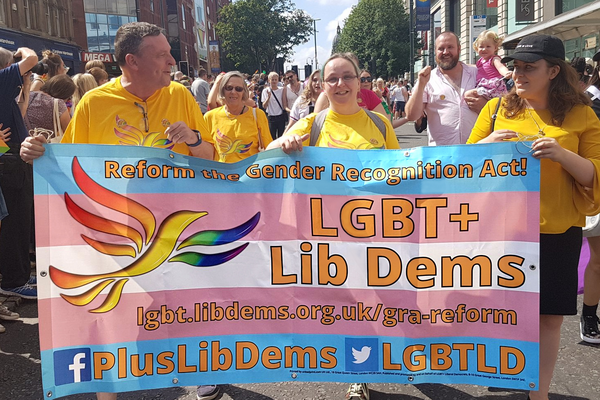Gender Recognition Act Consultation 2018
Background
The Liberal Democrats were the first political party to support trans people changing their legal gender back in 1998, and it was a Lib Dem backbench bill that first introduced the concept of Gender Recognition into the Houses of Parliament. However, it was not until the then Labour government was found in violation of human rights by the European Court of Human Rights that they finally passed the Gender Recognition Act 2004. Unfortunately, although the original act was an improvement on the existing situation and was supported by the Liberal Democrats - amendments to make it even more progressive were opposed by Labour - the original act contained many flaws.
One of these flaws is that the Act introduced a panel system for legal gender recognition. As part of this process, a "Gender Recognition Panel" (Which never meets any trans applicants) considers a number of pieces of evidence of transition including often costly medical reports and gas bills. Rejections or queries for more information by the panel have at times seemed capricious, such as querying someone's "commitment" to transition because they had children. We believe the current process is needlessly intrusive, expensive and complicated.
2018 Consultation
Now in 2018, the Government are consulting on reforming the Gender Recognition Act 2004 to streamline the process for obtaining a Gender Recognition Certificate. We are keen that positive replies are made to the consultation by those of us who want our trans friends, family and loved ones to have the freedom to change gender without a faceless, unaccountable bureaucracy.
Other countries, including Ireland, have adopted less bureaucratic approaches, based around a legally binding statement of intent. There have been no reports of significant issues surrounding this update, and the UK is now lagging behind other European countries on this crucial area of equality.
It is important to note that, contrary to misinformation spread by those associated with the US religious right, gender recognition has nothing to do with access to same-sex facilities. Trans people can already have gender markers on government ID updated when they transition, and the gender recognition process merely sorts out issues around things such as marriage/civil partnerships and pensions.
Official Party Policy
Unlike many other parties, this is in line with the policy of the whole Liberal Democrats, not merely an ask by the LGBT+ group. In 2014, the Liberal Democrats passed an updated policy on equalities, co-authored by LGBT+ Liberal Democrats executive member Zoe O'Connell and this included a commitment to trans rights. That policy states:
- "The drafting of the Gender Recognition Act 2004 (GRA) required that those seeking legal recognition of their gender obtain a medical diagnosis of 'gender dysphoria'. This diagnosis explicitly excludes those with intersex conditions, meaning that anyone whose gender was incorrectly identified or unable to be determined at birth is unable to obtain legal recognition. We would support an update of the GRA to be more inclusive by removing the requirement for a diagnosis of gender dysphoria."
- "Liberal Democrats have championed equal marriage and we want to make sure it applies to everyone, but this is not currently the case for transgender people. The Gender Recognition Act 2004 (GRA) requires that someone seeking legal recognition of their gender obtains written consent from a spouse, and allows a spouse to have a marriage voided if someone had obtained gender recognition prior to being married. These spousal vetoes on marriage are an area of much concern for the transgender community and we believe the law should be reviewed with the intention of removing them."
- "Many marriages have already been annulled to enable people to obtain gender recognition under the regime in place prior to the passage of the Same-Sex Marriage Act. It is not right that people were forced out of marriage by law against the desires of both partners just because one partner has transitioned. In reviewing the GRA, we would put a mechanism in place to allow couples, where one partner has transitioned, to reinstate their marriages with the consent of both partners."
(The full party policy document containing the above statements is available for download here)
Responses
If you would like some examples of responses to the consultation, one of our executive members Sarah Brown has given her responses on her blog.
You can fill out the consultation here.

